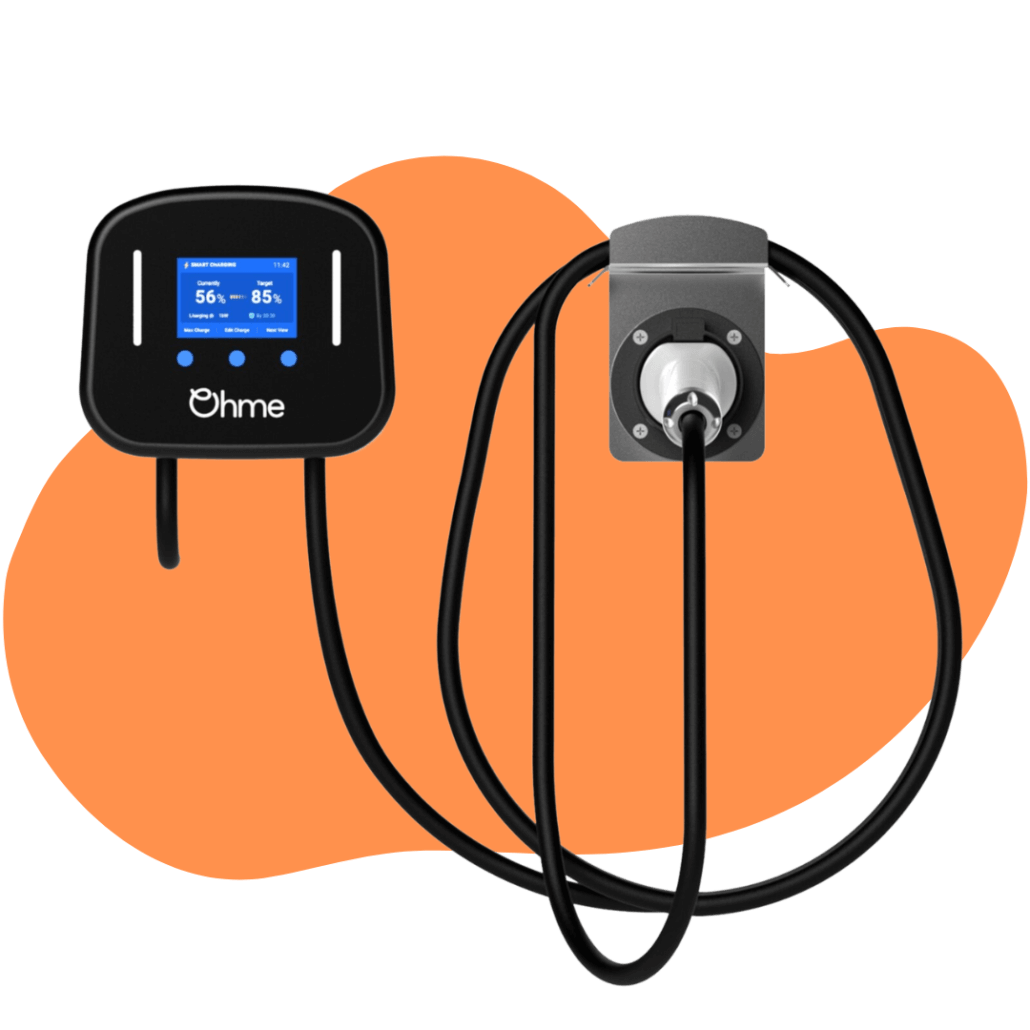Get an EV charge point with
MoneyExpert and save up to £304*

The Easee one
7.4kW output
harging cable is untethered so can be removed after use and utilised for other compatible chargers
Wi-fi and 4G connectivity for remote control of your charger

The Ohme Home Pro
7.4kW output
Charging cable is tethered so ready to use as soon as you pull up and can be locked when not in use.
4G connectivity for remote control of charger
Load management system - perfect for busy households

Zappi V2.1
7.4kW output
Charging cable can be attached and wrapped after use, or removed fully.
Wi-Fi connectivity for remote control of your charger
Load management system - perfect for busy households
Connects to solar panels
Everything you need to know about charging an electric car at home.
As electric cars become increasingly popular, one of the biggest concerns among electric vehicle (EV) owners is how to charge their vehicles conveniently and cost-effectively. In this article, we will explore everything you need to know about charging an electric car at home, including the types of chargers available, how to install them, and the benefits of charging at home.
EV Charging Stations Explained
EV charging stations are specifically designed to charge electric vehicles safely and efficiently. There are different types of charging stations that are typically broken down into three types of charging:
Slow Charging
up to 3.6kW
Most commonly straight from a standard three-pin plug. Will add around 11 miles of range per hour.
Fast Charging
up to 7kW - 22kW
7kW Charge Points are the fastest you can find on a home’s typical single-phase supply. They will add around 25 miles of range per hour. 22kW Chargers can only be installed on three-phase supply.
Rapid Charging
up to 50kW - 350kW
Most commonly found in public car parks and service stations, rapid charging can add 175 miles of range in just an Hour. Ultra-rapid Charge Points can fully charge an EV in as little as 30 minutes.
Charger Type
Charge Speed (kW)
Miles of Range Added per Hou
Slow
Up to 3.6kW
11 miles
Fast
7kW - 22kW
25 - 80 miles
Rapid / Ultra-Rapid
50kW +
175 miles +
How to Charge an Electric Car at Home
Charging your electric car at home is relatively easy, and there are different ways to do it. The most common method is to use a dedicated EV charging station, which can be installed in your garage or outside your home.
You will need to have space to park your car outside your home, whether that's in your garage or on a private driveway. It is possible to charge an electric car outside your home when parking on the street, but it's not ideal, as charging cables can get in the way of the pavement.
Can You Charge an Electric Car at Home with a Normal Plug?
While it's possible to charge an electric car with a standard wall socket or a 3-pin plug, it's not recommended. The reason is that these plugs are not designed to handle the high power demands of an electric car, which can result in overheating and damage to the plug or the car's charging system. Moreover, using a standard plug may not provide enough power to charge your EV quickly, meaning you could be waiting days for your car to charge.
What Type of EV Charger Do You Need?
With so many EV charging options available on the market, it can be overwhelming to decide which type of charger is best suited for your needs. Here are some factors you need to consider:
Tethered vs Untethered
When choosing a home EV charger, you can opt for a tethered charger with a permanently attached cable or an untethered charger with a socket. Tethered chargers are more convenient to use, but less versatile as they only work with specific plugs. Untethered chargers are more versatile, but less convenient as you need to bring your own cable.
Type of Plug
The next factor to consider is the type of plug that your EV charger is compatible with. In the UK, most electric vehicles use either a Type 1 or Type 2 connector. Type 1 connectors are mainly used by Japanese and American vehicles, while Type 2 connectors are more common in European vehicles. It is essential to ensure that your EV charger is compatible with the type of plug used by your electric vehicle.
Rate of Power
The rate of power is another important factor to consider when selecting a home EV charger. The power rating of an EV charger is measured in kilowatts (kW). The higher the power rating, the faster your car will charge. However, you need to ensure that your electric vehicle can handle the rate of power that your EV charger provides. Most electric vehicles have a maximum charging rate, and if your EV charger provides a higher rate of power, it may damage your car's battery.
What is a Smart EV Charger?
Smart EV chargers are the next generation of electric vehicle chargers that offer advanced features such as connectivity, remote monitoring, and energy management. These chargers are designed to be more than just a simple plug-and-charge device, but rather an integrated solution that can optimize the charging process and save you money on your energy bills.
With a smart EV charger, you can remotely monitor and control your charging sessions, schedule charging for off-peak hours when electricity rates are lower, and even set up alerts for when your car is fully charged or if there's an issue with the charger.
However, smart chargers do cost more to buy and install, so if you don’t think you need these extra features, you may benefit more from a normal electric car charger.
How to Install an Electric Car Charging Station at Home
Installing an electric car charging station at home can be a complex process, and it's recommended to hire a licensed electrician or a professional installer to do the job. The installation process may involve upgrading your electrical panel, running a dedicated circuit to the charging station, and obtaining any necessary permits and inspections.
How Much Does an Electric Car Charging Station Cost?
The cost of an electric car charging station can vary depending on several factors, including the type of charger, the power output, the brand, and any additional features, such as Wi-Fi connectivity and smart charging. Level 1 chargers are the most affordable, with prices starting from around £200. Level 2 chargers can cost between £400 and £1000, while Level 3 chargers can cost several thousand pounds. In addition to the cost of the charger, you should also consider the energy costs of charging your EV, which can vary depending on your utility provider and the time of day you charge.
EV Charger Grants
If you're considering installing a home EV charger, you may be eligible for a grant from the government to help cover the cost. The Office for Zero Emission Vehicles (OZEV) offers a grant for home EV chargers, which covers up to 75% of the cost of the charger (up to a maximum of £350).
This grant is no longer available to homeowners who reside in single-unit properties i.e. most houses and bungalows, but it is open to those who live in flats and rented properties. There is also a grant for landlords who want to upgrade a property they let out.
To be eligible for the grant, the chargepoints must be installed by an OZEV-approved installer, and the property must meet certain requirements, such as having off-street parking for a home charger.
Benefits of Charging Your Electric Car at Home
There are several benefits to charging your electric car at home, including:
Convenience
One of the most significant benefits of charging your EV at home is the convenience it provides. You can simply plug in your car when you get home and have it fully charged by the morning. This eliminates the need to make regular trips to a public charging station, which can be time-consuming and inconvenient.
Safety
Charging your EV at home is also safer than using a public charging station. With your own charging station, you have complete control over who uses it and when. Public charging stations, on the other hand, may not be secure, and you may be at risk of theft or vandalism.
Savings
Charging your EV at home can also save you money in the long run. Electric cars are already cheaper to run than petrol or diesel cars, and charging at home can further reduce your energy costs. With the right tariff, you can take advantage of cheaper electricity rates during off-peak hours, which can significantly reduce your charging costs.
How Long Does It Take to Charge an Electric Car at Home?
The time it takes to charge an electric car at home depends on several factors, including the type of charger, the power output, and the size of your car's battery. The average time it takes to charge an electric car at home is around 8-12 hours for a Level 2 charger, depending on the size of the battery.
Finding the Right Home Charging Station
If you're considering installing a home charging station for your electric car, it's important to choose the right one for your needs. With the right charging station and a little bit of planning, you can enjoy the benefits of electric driving while saving money and reducing your carbon footprint.
* Saving of £104 on The Easee One vs online retail price of £1074 (www.chargepointev.co.uk, May2023) Saving of £304 on The Ohme Home Pro vs online retail price of £1299 (www.plugitingroup.co.uk, May 2023) Save £154 on the Zappi V2.1 vs online retail price of £1329 (www.mcnallyev.uk, May2023) The average cost of charging on the public network is £1,838 a year vs £383 when charged at home (www.thisismoney.co.uk, March 2023)
Last reviewed: 1 July 2025
Next review: 1 August 2025
